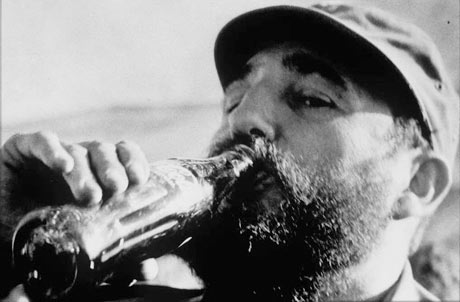Jeremy Waldron of the New York Review of Books has an article about legal scholar Cass Sunstein, who believes a nudge is often better than a “no,” though it’s not always easy to define the distinction.
Of the examples of nudge-ish paternalism provided in the below excerpt, the one that most bothers me is the TV that’s programmed to always turn on first to PBS. It feels like a violation of personal space and an oppression of cultural tastes. Plenty of gatekeepers have been wrong over the years, while the masses have been right. Cheap comics weren’t a plague and rock music wasn’t just a bunch of noise.
It’s true, though, that the absence of paternalism doesn’t mean we have unobstructed free will. Corporations don’t just nudge but shove us toward their products (here and here), often unhealthy ones, and some pushback is warranted. An excerpt:
“Cass Sunstein is a Harvard law professor and the author of dozens of books on the principles of public policy. He knew Barack Obama from Harvard Law School and in 2009, he was appointed administrator of the White House Office of Information and Regulatory Affairs. Sunstein’s thought about nudging is evidently the fruit of his determination to consider alternatives to the old command-and-control models of regulation. Now, with his government service behind him (for the time being), he has given us another book, called Why Nudge?, in which he provides an accessible defense of what he calls ‘libertarian paternalism’—a good-natured paternalism that is supposed to leave individual choosing intact.
‘Paternalism’ is usually a dirty word in political philosophy: the nanny state passing regulations that restrict us for our own good, banning smoking and skateboarding because they’re unsafe, or former New York City Mayor Michael Bloomberg trying to limit the size of sugary sodas sold in New York City—’the Big Gulp Ban.’ Now, a nudger wouldn’t try anything so crass. If you ordered a soda in nudge-world, you would get a medium cup, no questions asked; you’d have to go out of your way to insist on a large one. Not only that, but diet beverages would probably be the ones displayed most prominently in nudge-world and served without question unless the customer insisted on getting the classic version from under the counter.
You could order a supersized sugary beverage if you wanted it badly enough, but it wouldn’t be so convenient to carry it to your table because Thaler and Sunstein are in favor of abolishing trays. It is all too easy to load up a tray with food that will never be eaten and napkins that go unused. You could insist on a tray if you wanted to hold up the line, but a tray-free policy has been proved to lower food and beverage waste by up to 50 percent in certain environments. Nudge and Why Nudge? are replete with examples like this.
Nudging is paternalistic, but it is surely a very mild version of paternalism. It’s about means, not ends: we don’t try to nudge people toward a better view of the good life, with compulsory library cards, for example, or PBS always coming up when you turn on your TV. And it is mild too because you can always opt out of a nudge. Not that Sunstein is opposed to more stringent regulations. Sometimes a straightforward requirement—like the rule about seat belts—might be a better form of paternalism. These options are left open for the regulator.”
Tags: Cass Sunstein, Jeremy Waldron

